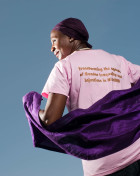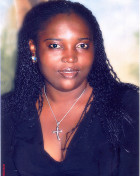I am currently the Director, External Relations and Advocacy to the International Planned Parenthood Federation Africa Regional Office in Nairobi. My role is to build and strengthen partnerships with multilateral and bilateral organisations and in particular, the African Union and Regional Economic Commissions to ensure that sexual and reproductive health and rights remain key priority issues within development discourse both in Africa and at the global level. I am responsible for communicating the work of IPPF and its 42 Member Associations in 42 countries in Sub-Saharan African and building relationships with donors to increase funding to expand IPPF’s service provision.
I call myself a feminist because I see that patriarchy bestows an unfair advantage to men, working from the premise that men are latently superior to women. I understand that this is the premise that guides all institutions, policies, laws and relationships, and that it puts women at a disadvantage. The inability of women to occupy political space, have equal access to education, control over their bodies, in particular sexual choices etc and the lower status they have are all attributable to this fact. My being a feminist is a lifelong struggle to break patriarchy, both at a personal and professional level.
The key challenge for feminists in Africa is that feminism seems to be losing steam and not enough women are being brought on board to understand what it means and to subscribe to it. It always seems to be a losing battle as more and more women are subscribing and re-affirming patriarchy and this is being strengthened by the increasing and alarming rise of religious fundamentalism, both Islamic and Christian.
What I think is needed to strengthen the feminist movement in Africa is strong movement building to expand understanding and recruiting of feminists amongst young women through different means – social networks, universities, using fun ways to engage young women; work with universities to introduce feminism as undergraduate curricula; and mass dissemination of what feminist ideals are. I also think that the Feminist Charter should be shared with as many people as possible but more importantly, it should start being incorporated into the Principles of Organisations in Africa that identify as ‘Feminist Organisations’ or are led by Feminists. Not so much word for word, but the underlying principles.
In my personal and professional life I continue to mentor young women to understand that they have choices and my whole professional life has been dedicated to promoting the rights of women – to political participation, to have sexual autonomy, to lead – and in this way, contribute to the dismantling of patriarchy.
I am inspired by the possibility of change in the future, by women who have achieved a lot and opened up spaces, by women who work day in and out without complaining under hideous conditions and most of all, I am inspired by Africa and the promise it holds.




